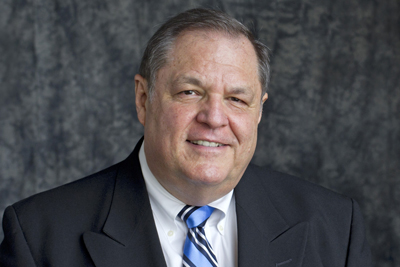George Gokel’s office walls are lined with books. Family photos are prominently displayed, jazz plays softly in the corner and a steady stream of students come to his door. Described as a brilliant scientist with numerous publications and awards to his credit, the affable professor has just taken on a new challenge.
Gokel, Distinguished Professor of Science at the University of Missouri–St. Louis, recently was named director of UMSL’s Center for Nanoscience. Opened in 1997, the center’s centralized analytical facilities support 19 faculty members and more than 40 graduate students and post-doctoral research associates. His new post became effective October 1 following the resignation of Jingyue Liu, who returned to Arizona State University.
“Our goal at the center is to try to form an intellectual nexus among people in different departments – chemistry, biochemistry, physics, biology, psychology and optometry – and do together the things we can’t do alone,” said Gokel.
As he does often, Gokel praises his students and colleagues.
“The best people at UMSL are as good as the best people anywhere,” he said. And Gokel understands best.
He came to UMSL in 2006 after 13 years at Washington University in St. Louis School of Medicine as professor of molecular biology and pharmacology. He earned his doctorate in chemistry at the University of Southern California and was awarded a post-doctoral fellowship at UCLA. His research took him to some of the nation’s top universities.
His research interests are in new, synthetic compounds that can form tunnel-like pathways (channels) in membranes – the barriers that surround cells. These channels typically help nutrients enter and waste products exit cells. His recent work is focused on creating pathways that will assist the entry of drugs into cells.
Gokel is quick to share the excitement of his appointment with Eric Majzoub, the new associate director of the center and an associate professor of physics and astronomy at UMSL.
“Eric has initiated a program to focus grant applications for the center, which will help us build a research and grant portfolio,” said Gokel. “That will increase the scope and sphere of influence of the center with individuals in other disciplines.”
Gokel said Majzoub recently received a joint grant with an investment firm to use polymer technology. Majzoub’s research focuses on the study and design of new materials for energy storage and conversion as well as sensing technologies. Those new sensor technologies are very important for military use.
“Conducting polymers have already been developed by a St. Louis company with which the CNS is collaborating,” said Gokel.
It’s that kind of research that fulfills another goal of the center: to contribute to the economic growth of the region and state, said Gokel.
He also touts another nanoscience success: the Microscopy Image and Spectroscopy Technology laboratory. The MIST lab provides the equipment and academic expertise for various types of specimen preparation and microscopic analysis for both the academic community and local industries.
“We started this (MIST laboratory) program at one of the worst economic times in history,” said Gokel. “It’s been quite successful. We provide analytical services and charge fees for those services. The income helps finance the ongoing work at the center.”
Gokel has published more than 400 peer-reviewed papers, authored, co-authored or edited 10 books and is named as an inventor on more than 15 patents, sits on the editorial boards of numerous scientific journals, and was named to a scientific review committee at the National Institutes of Health through 2013. To add to the many awards he has received over his career, he received the Chancellor’s Award for Excellence in Research and Creativity in May.
At a time in life when many of his colleagues have retired, Gokel continues to take on new challenges. He retired once in 2006 to take on the work of helping to expand UMSL’s nanoscience center. His retirement gift was a rocking chair. For now, it sits in a corner of his busy office collecting dust.















